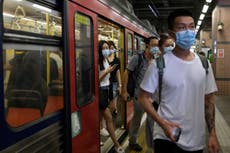Despite the uncertainty surrounding coronavirus, cases of reinfection aren’t what they seem
The recent confirmation that people can be reinfected with the virus is a moment many virologists have been waiting for – but there’s no need to panic, writes Samuel Lovett


Your support helps us to tell the story
From reproductive rights to climate change to Big Tech, The Independent is on the ground when the story is developing. Whether it's investigating the financials of Elon Musk's pro-Trump PAC or producing our latest documentary, 'The A Word', which shines a light on the American women fighting for reproductive rights, we know how important it is to parse out the facts from the messaging.
At such a critical moment in US history, we need reporters on the ground. Your donation allows us to keep sending journalists to speak to both sides of the story.
The Independent is trusted by Americans across the entire political spectrum. And unlike many other quality news outlets, we choose not to lock Americans out of our reporting and analysis with paywalls. We believe quality journalism should be available to everyone, paid for by those who can afford it.
Your support makes all the difference.The revelation that some people can be reinfected with Sars-CoV-2, the virus responsible for Covid-19, will have sent a shiver down the spine of many. Confirmation first came from Hong Kong, where scientists proved via genome sequencing that a man had been infected with two different strains of the pathogen, before similar reports surfaced in the Netherlands and Belgium.
Understandably, such developments have raised concern over the the effectiveness and longevity of the natural immune response triggered among those who have been infected with the virus. Likewise, questions are now being asked over what role a vaccine will be able to play during the course of the pandemic: will vaccination offer sufficient, long-lasting protection? Will booster shots be required? Is there a chance of retransmission?
But amid this climate of uncertainty, those attempting to decipher the mystery of the virus have insisted there is no need to panic. “It should be no surprise to anyone that there has been reinfections,” Jonathan Stoye, a virologist at the Francis Crick Institute, tells The Independent. “We’ve always known this was a possibility.”
If anything, it is a moment that many virologists have been waiting for, such is the fluctuating, variable nature of the human immune system. Deeply complex and intricate, this unique defensive guard provides a spectrum of responses to which there is no discernible rhyme or rhythm. This means that while one individual may develop the full protection required to see off and prevent any future infections, others are unable to do so, leaving them susceptible to a second round of disease.
In the case of Sars-CoV-2, with 23 million reported infections and rising, some experts had expected to see more cases of reinfection by now, especially among health workers who are placed in close proximity with the virus on a day-to-day basis.
It could well be the case that reinfections are simply harder to spot and identify. Indeed, a mid-May survey by the doctors’ information-sharing site Sermo found that 13 per cent of the 4,173 doctors responding believed that they had treated one or more patients who were reinfected. Among the respondents, 7 per cent of those in the US and 16 per cent in other countries thought they’d seen such a case.
The likes of Stoye and others have meanwhile pointed out that there is a long history of humans being reinfected by coronaviruses, so “why should this latest one be any different?” Indeed, British experiments in the 1980s showed that some people who were infected with the common cold could be reinfected one year later.
As for the Hong Kong case itself, there is some cause for optimism wrapped up in the finer details. According to the study released on Monday, the man in question was asymptomatic during the second course of infection in August, having been hospitalised with a mild illness the first time round in March. This, says Stoye, is “consistent with the idea that you are building some kind of immunity which will protect you”.
Mark Slifka, a viral immunologist at Oregon Health & Science University, echoed this sentiment. “Even though [the patient] got infected with a very different strain that’s distinct from the first time around, they were protected from disease,” he said on Monday. “That is good news.”
What remains unknown is whether this individual was capable of spreading the virus on the second occasion. “The key question is could he have infected other people, which is obviously a bigger concern – and that’s a harder one to answer,” Dr Jeffrey Barrett, from the Wellcome Sanger Institute, tells The Independent. And nor does the Hong Kong study “really comment on this”, he adds.
Still, Barrett insists that this case “should not change the strategy” that has been adopted for tackling the pandemic. “Of the millions of cases identified, this is the first validated one,” he says. “If you look at different studies, it’s clear that a decent fraction of people do develop and maintain long-term antibodies after being infected. We can be confident this isn’t a common event.”
So where does a vaccine fit into the picture, then? Irrespective of such developments, Brendan Wren, a professor of microbial pathogenesis at the London School of Hygiene & Tropical Medicine, argues that it “should still be full steam ahead” in the race to produce a form of immunisation.
He argues that with so much of the global population left to be infected, it’s unlikely the virus will mutate beyond the point of recognition, rendering any potential vaccines irrelevant. He admits that “it’s too early to say” whether booster jabs will be needed – though on the basis of the types of vaccines currently in development, there’s a high chance this will be the case.
Stoye offers a different take. “It may be – and I don’t know – but it may be that on a whole the antibody neutralising response following vaccination is higher than we get in some natural infections,” he says. Data from the phase one trial of Moderna’s vaccine adds weight to this theory. After 57 days, participants in the study had on average more antibodies than a group of 38 recovered patients, whose symptoms were mainly mild or moderate.
This raises the faint hope that vaccination could in fact offer greater immunity than natural-developed protection, and therefore safeguard against the threat of reinfection. However, there is still long way to go – both in terms of producing a vaccine and understanding how the Hong Kong findings will impact these developments. “It’s too early to draw firm conclusions,” adds Stoye.
Still, one issue to keep an eye on is the emergence of any new mutations in Sars-CoV-2 and what this would mean for the prospect of reinfection.
In the Hong Kong case, researchers found 24 differences between the first and second viral genome. There was nothing to suggest that the second iteration of the virus was more aggressive or contagious – if anything, emerging data suggests that the pathogen is becoming less deadly – but it’s impossible to tell how future versions will interact with the human body.
“It will mutate, but whether it mutates one way or the other, we’ll have to wait and see,” Wren tells The Independent, adding that mass vaccination may “apply selective pressure for new variants of the virus to emerge”.
In spite of such possibilities – and the general sense of despair that has arisen from the recent reports of reinfection – Wren remains optimistic that humanity is headed in the right direction, as do many others in his field. “The fact that there are so many cases and so few reinfections would suggest there’s an appropriate immune response out there which we can capture with a vaccine,” he says. “That should give us hope.”

Join our commenting forum
Join thought-provoking conversations, follow other Independent readers and see their replies
Comments